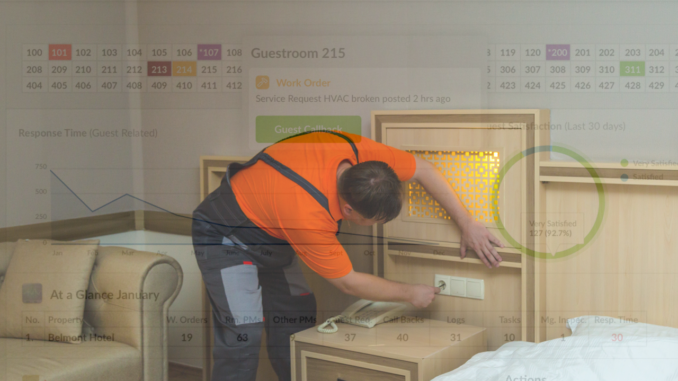
Scott Schaedle, founder and CEO of Quore - 12.13.2023
Hospitality technology played a role in transforming the hotel industry long before the pandemic. Even more so today, through the impact of rising costs in operations, labor challenges, and shifts in customer needs, technology is widely recognized as being at the forefront of hotel operations. But, as more hotels adopt technology to streamline operations, more pressure is put on technologists to advance and come out with “the next best thing.” In my experience over the past decade working with several hotel brands and management companies, what proves clear is that a good technology solution is not one-size-fits-all. The next best thing might certainly be in the works, but today, hotels are all demanding one thing: solutions that cater to their individual needs.
While many hotel brands may have already adopted the tried-and-true technologies of the past decade, they can just as easily grow out of them. We’re in a competitive industry, and if a technology is unable to adapt to the changing needs of your customers, your survival is at risk. From working with hotels pre-, during, and post-pandemic, we’ve seen needs change drastically, but we’ve also seen smaller incremental changes to how hotels are approaching business. Our role as a technology partner is to work with our customers. Rather than advancing our own technologies in a silo, we seek to adapt our technology alongside hotels through customization and options that both satisfy their needs for today and grow with them tomorrow.
What that looks like can vary drastically. Sometimes it’s as simple as custom brand-compliant preventative maintenance templates, or on the opposite end of the spectrum, a proprietary tech solution. Where we’ve found ourselves recently is somewhere in the middle by providing integration capabilities which range from integrations with a brand’s proprietary software to fellow preferred solutions.
Not all hotels are built the same, and hotel management companies often have their own standards that need to be incorporated. For a management company, finding one technology to be used across all hotel brands in their portfolio could prove challenging when some hotels also require adherence to their own brand standards. That’s why we support integrations with multiple brand solutions in addition to their preferred vendors. At the end of the day, our goal is to simplify the workday for hoteliers and their staff.
This past year we announced Cleanings Plus Data Integration Powered by IHG Concerto allowing room status details to be leveraged to improve the performance of housekeeping teams at IHG-branded hotels. Enabling IHG hotels to use a digital hotel management approach led IHG/Avid Hotel general manager Tony Cancemi to track the work his team was performing each day more efficiently through his existing software. Using the integrated solution, the Avid Hotel team was able to achieve a 25% reduction in housekeeping, 20% below brand-standard room cleaning time, and a 100% cleaning score. Rather than creating a new solution, we worked as a team to make sure our solution could work for Tony today and in the future.

As we continue to look for ways to solve our customers’ challenges, we also believe that technology should be advancing to meet the needs of those who are using the platform the most. When developing new solutions, we prioritize simplifying the experience for our users. Technology advancements don’t always have to look big and earth-shattering. Sometimes it takes a minor adjustment, made with hotel staff in mind, that leads to an easier path to adoption, and in turn, a happy management team.
All of this isn’t to say that new technologies won’t have a place in the hospitality industry. Artificial Intelligence (AI) is already impacting the hospitality market. Hotels are looking at ways to incorporate or prepare to incorporate AI-driven solutions into the way they conduct business. We should be in tune with the capabilities AI can bring, and how its impact can change how customers interact with hotel services, or how hotels market their services to new guests, but we also need to understand when the right place and time is for new technologies to be leveraged in our own solutions. As new advancements in AI and automation are tested, technologists can start to look deeper at how those tools could be leveraged in your existing solutions.
Technology should and will continue to evolve in the hospitality industry, but in order for hotels to advance in their operations and guest experience, solutions need to be customized. If you have a partner driving your technology solutions, you should be aware of whether those solutions are tailored to your specific needs. Consider the inefficiencies that are holding your hotel back from achieving higher guest satisfaction and how a customized solution can help drive your team forward.
 Scott Schaedle is the founder and CEO of Quore, a hospitality technology company he founded in 2012. Quore is a cloud-based service optimization solution that helps hotel teams boost productivity, create clearer communication, and improve overall guest satisfaction. Scott’s passion for innovation and design drives everything he does. It led him to pursue a degree in Advertising Design and Fine Arts at the Atlanta College of Art, then onto the Savannah College of Art and Design where he received a BFA in Advertising. Scott was working as an engineer in a local Franklin, TN, hotel when he saw a need to streamline staff operations and was inspired to create Quore. In November 2016, four years after founding Quore, Scott was named one of the top innovators in hotel operations by Lodging Magazine. The company recently celebrated 11 years of serving hotels in all 50 states and 35+ countries and Scott is excited to continue its growth and expand future product offerings.
Scott Schaedle is the founder and CEO of Quore, a hospitality technology company he founded in 2012. Quore is a cloud-based service optimization solution that helps hotel teams boost productivity, create clearer communication, and improve overall guest satisfaction. Scott’s passion for innovation and design drives everything he does. It led him to pursue a degree in Advertising Design and Fine Arts at the Atlanta College of Art, then onto the Savannah College of Art and Design where he received a BFA in Advertising. Scott was working as an engineer in a local Franklin, TN, hotel when he saw a need to streamline staff operations and was inspired to create Quore. In November 2016, four years after founding Quore, Scott was named one of the top innovators in hotel operations by Lodging Magazine. The company recently celebrated 11 years of serving hotels in all 50 states and 35+ countries and Scott is excited to continue its growth and expand future product offerings.
Are you an industry thought leader with a point of view on hotel technology that you would like to share with our readers? If so, we invite you to review our editorial guidelines and submit your article for publishing consideration.
